














 The President, The President,Mr. Ranil Wickremesinghe, Minister of Environment |

The State Minister
Mr. Janaka Wakkumbura, |
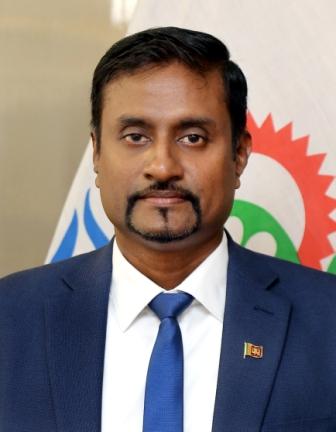 Message of Mr.Venura Fernando, Chairman of Central Environmental Authority Message of Mr.Venura Fernando, Chairman of Central Environmental Authority
Central Environmental Authority, which is one of the key institutions operating in Sri Lanka ...Read more
|

Message of Mr. Hemantha Jayasinghe, Director General of Central Environmental Authority
The mutual bond that exists between the human race and the environ....Read more
|
The Central Environmental Authority (CEA) was established in August 1981 under the provision of the National Environmental Act No:47 of 1980. The Ministry of Environment and Natural Resources (ME&NR) which was established in December 2001 has the overall responsibility in the affairs of the CEA with the objective of integrating environmental considerations in the development process of the country. The CEA was given wider regulatory powers under the National Environment(Amendment) Acts No:56 of 1988 and No:53 of 2000.
Sri Lanka has given high priority to economic development to raise the standard of living of its citizens. Development projects funded by both local and foreign capital play a major role in the economic development process. The share of private sector based development projects has been increasing rapidly in recent decades.
Most of the resources needed for development in Sri Lanka come from its environment. Thus it is imperative that environmental resources are conserved and enhanced to sustain development.
The National Environment Act introduced an internationally accepted process called Environmental Impact Assessment (EIA) as part of the strategy to achieve sustainable development.
EIA is a simple and straightforward process of first predicting the potential impacts of development activities on the natural and social environment, and then suggesting measures to prevent or minimize negative impacts and to enhance positive impacts
The legal framework for the EIA process in Sri Lanka has been laid down in the National Environmental Act (NEA) in 1988. The EIA process under the NEA is summarized below;
EIA process is mandated only for large scale development projects or projects which are located in environmental sensitive areas. The types of projects which require EIA have been prescribed in the Gazette (Gazette No. 772/22 of 24.06.1993).
EIA process is implemented through designated “Project Approving Agencies (PAA)” led by the Central Environmental Authority (CEA). The PAAs are EIA administrative agencies that are responsible for guiding the EIA for projects and for issuing EIA approval or rejection. A single PAA is appointed as the appropriate PAA for each EIA by the CEA.
Any prescribed project submitted for approval requires to submit either an Initial Environmental Examination (IEE) report or Environmental Impact Assessment (EIA) report. The prescribed projects which do not have complex environmental issues require an IEE report while the projects which involve complex environmental issues require an EIA report.
The EIA reports are required to be open for public inspection and comment for a mandatory period of 30 days.
The project proponent needs to submit some preliminary information about the project to the CEA, in order to initiate the EIA / IEE process. The project proponents are advised to submit preliminary information to the CEA at a very early stage in the project cycle. The project proponent could submit the preliminary information through a Basic Information Questionnaire which could be obtained from the CEA Head Office or Provincial / District Offices or downloaded from the CEA website.
EIA / IEE process involves 6 major steps; (i) screening (ii) scoping (iii) preparation of the EIA / IEE report (iv) review of the report (by the public and the PAA) (v) approval with terms and conditions or rejection with reasons (vi) post approval monitoring. The step wise process has been defined in the EIA regulations which have been published in the Gazette No. 772/22 of 24.06.1993
EIA / IEE process involves 6 major steps;
| Steps | Time allowed for the PAA | ||
| 1 | Screening (Determining whether an EIA / IEE is required for a project) | 6 days | |
| 2 | Scoping (Determining the scope of the EIA / IEE study and issuing of Terms of Reference) | 14 days for IEE and 30 days for EIA | |
| 3 | Preparation of the EIA / IEE report | No time limit has been given since the project proponent is responsible for this. | |
| 4 |
Review of the EIA / IEE report |
||
| (a) | Public review (applicable only for EIAs) The project proponent needs to respond to the public comments received. | 30 working days | |
| (b) | Technical review | 21 days for IEE and 30 days for EIA. | |
| 5 | EIA / IEE Decision Granting approval with terms and conditions or rejection with reasons. |
||
| 6 | Post approval monitoring | ||
The PAA is responsible for implementation of each step of the process except preparation of EIA / IEE reports. The project proponent or consultants hired by the project proponent is responsible for preparation of the EIA / IEE report.
The time allowed for the PAA for each step has been stipulated in the Gazette (as described above) provided that the information submitted by the project proponent is sufficient to proceed. There is no time limit given for preparation of the EIA / IEE report by the project proponent.
EIA regulations under the NEA are applicable only for projects which are located outside the coastal zone. The EIA process for projects located within the coastal zone is handled by the Coast Conservation Department.
Environmental Recommendation is a document issued by the Central Environmental Authority with conditions to control & manage the environmental issues before the establishment of an activity which the investors have to abide by.
Any activity which does not come under the EIA or IEE procedure and possibility of discharging effluents, wastes, emission of smoke/gases/fumes /vapour or excessive noise/vibration into the environment.
From the Provincial and District Offices of the Central Environmental Authority or from the Board of Investment of Sri Lanka (BOI), for activities registered under section 17 of the BOI Act No 4 of 1978.
Applications could be downloaded from CEA web site www.cea.lk , Head Office or any other Regional Offices.
30 days minimum
Survey Plan
For state lands consent letter from the relevant Authority ( Forest Department, Divisional Secretary, Dept. Wild Life, Mahaweli Authority, CCD , UDA etc.)
Road map showing the main landmarks from the nearest town for the easy access to the industry/activity.
The Environmental Recommendation is valid for one year from the date of issue.
Based on the details furnished by the investor:
Minimum amount of inspection fee is Rs. 3000/= + applicable Govt taxes.
All the activities which are published in the Gazette Notification No.1533/16 dated 25.01.2008 as prescribed activities have to obtain an Environmental Protection Licence.
If you have already obtained an Environmental Recommendation it is a pre requisite to obtain an EPL.
EPL application forms could be obtained free of charge from the CEA, from the website www.cea.lk or from Local Authorities.
If your activity comes under Part ‘A’ or ‘B’ submit your application to Provincial or District offices of the Central Environmental Authority.
If your activity comes under Part ‘C’ submit your application to respective local authority ( Municipal Council / Urban Council / Pradeshiya Sabha )
The applicant shall take necessary actions to maintain quality of the environment to conform to the standards and criteria stipulated by the regulations (link to web) of the National Environmental Act (NEA).
Part “A” - validity period 01 year - EPL fee is Rs.7500.00 + applicable govt. taxes.
Part “B”- validity period 03 years - EPL fee is Rs.6000.00 +applicable govt. taxes.
Part “C”- validity period 03 years - EPL fee is Rs.4000.00 +applicable govt. taxes.
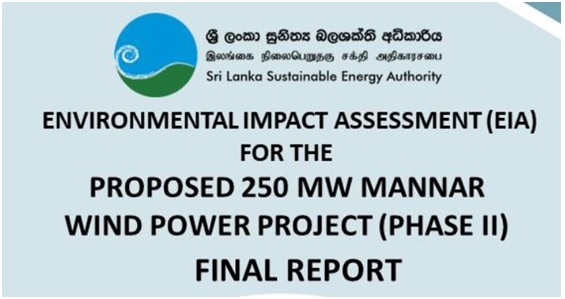
Mannar Wind Power Project Phase II EIA Final PDF - English Sinhala Tamil
Annexes - PDF
Project open for the public review for 30 working days from 23.01.2024 to 06.03.2024
Please come back soon.
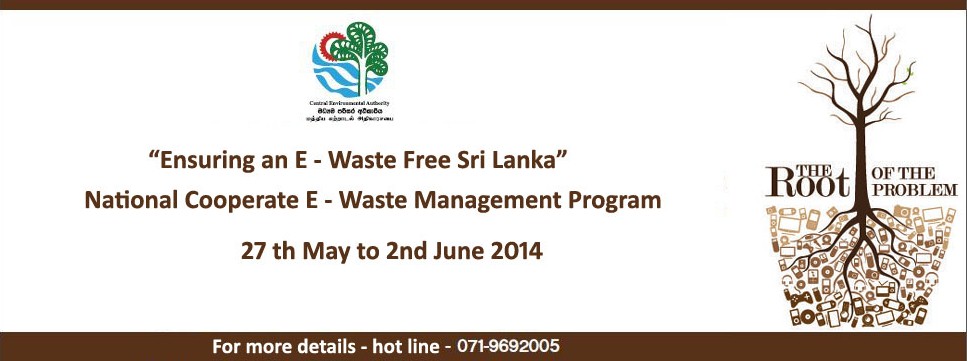
E – Waste is a popular, informal name for electronic products that have come to the end of their “useful life” Computers, Televisions, Mobile Phones, Calculators, Stereos, Copiers, Electronic toys and Fax machines are common electronic products.
Considering the environmental consequences of improper management of waste electrical and electronic Equipment (E- Waste), it is urgent requirement to direct these to existing systematic management mechanisms.
Central Environmental Authority as the regulatory arm for the environmental management in the country has declared a week for “National Waste Electrical and Electronic Equipment Management” from 27th May to 2nd June 2014.
Main event on signing memorandum of understanding with partner companies for safe collection and disposal of E-Waste will be held on 26th May 2014 at BMICH Mihilaka Medura.
Within the E-Waste management week following programmers have been lined up,
Obtain Environmental Protection License and Protect the Environment..
Scheduled Waste Management Licensing - generate collect, transport, store..
Resolving public complaint related to environmental issues..
Supporting for better decision and planning through GIS/Remote sensing technology...
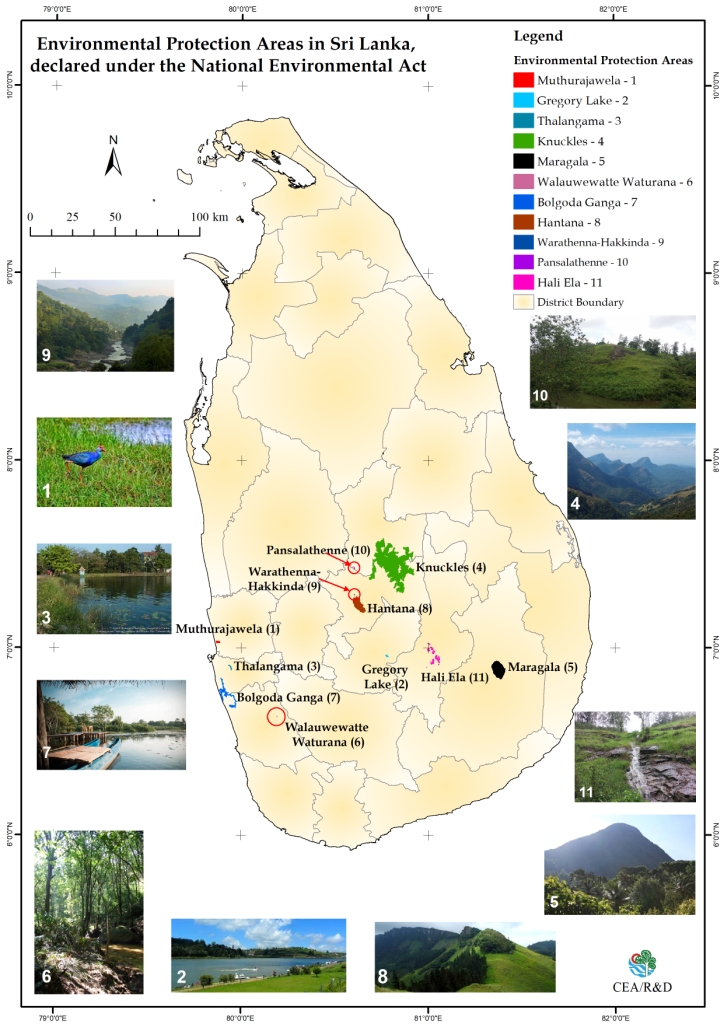
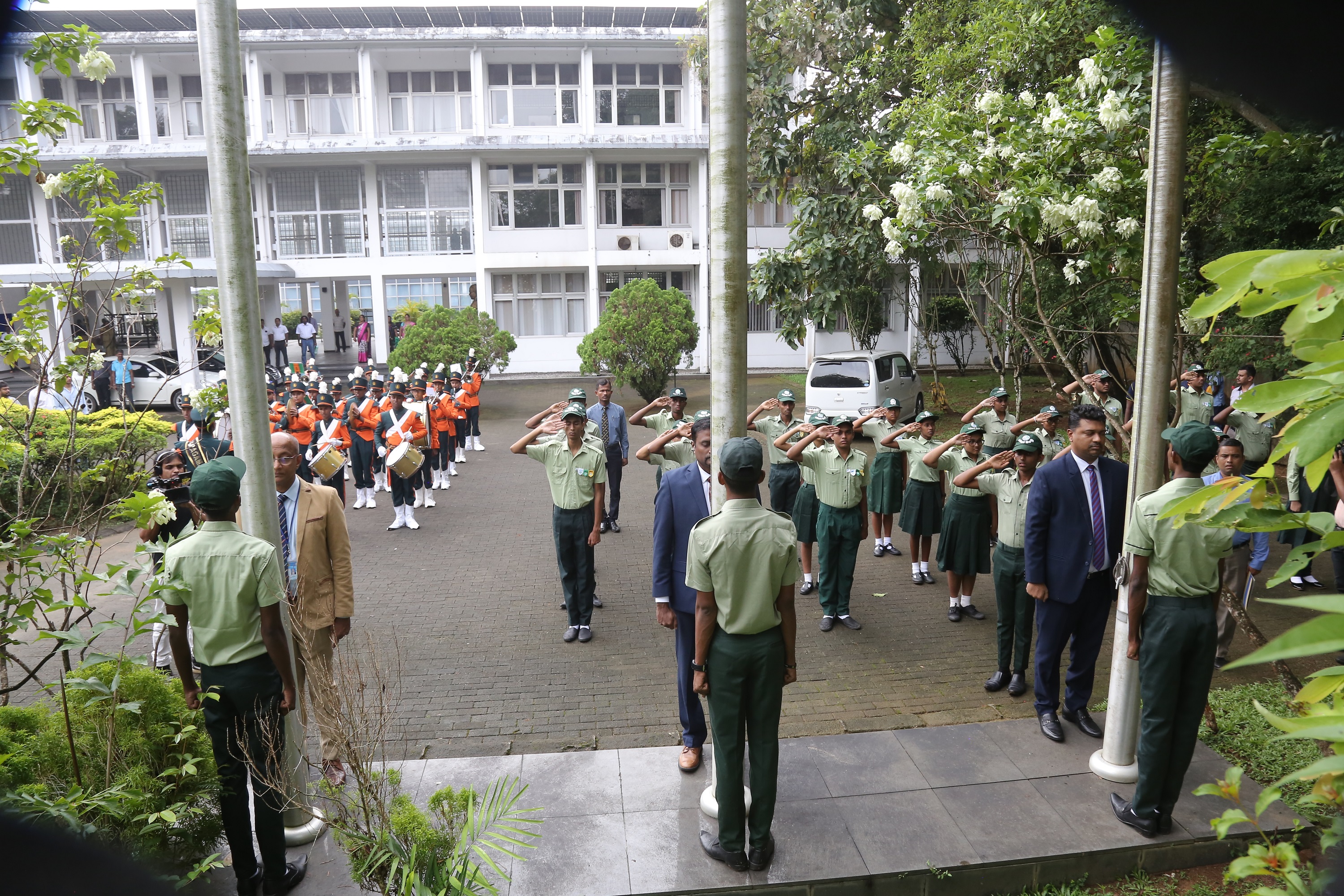 The Central Environmental Authority organized the 16th...
Read more
The Central Environmental Authority organized the 16th...
Read more
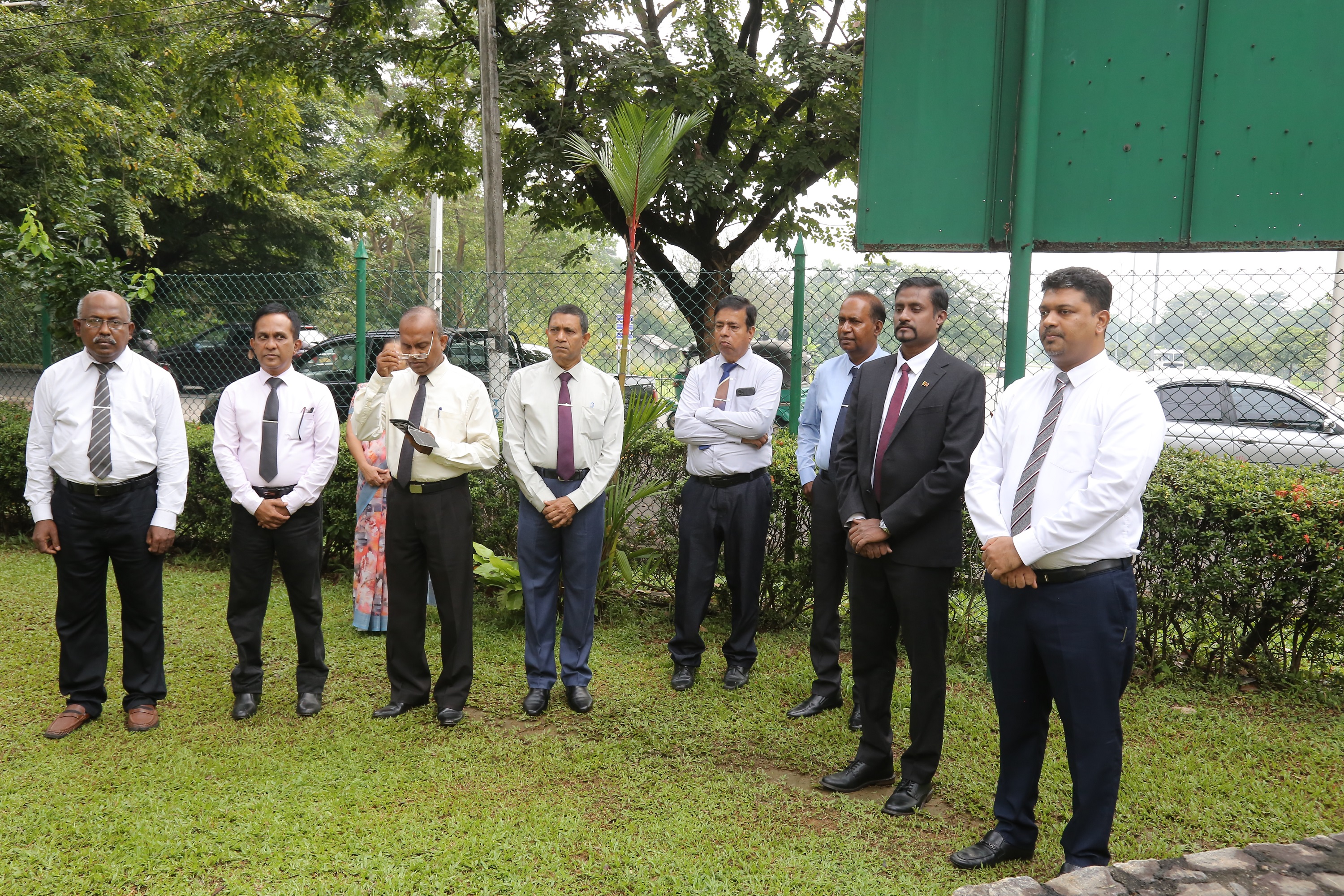 To mark the commencement of the New Year 2024, the...
Read more
To mark the commencement of the New Year 2024, the...
Read more
 The World Wetlands Day national program held on February...
Read more
The World Wetlands Day national program held on February...
Read more
 The Central Environmental Authority conducts many...
Read more
The Central Environmental Authority conducts many...
Read more

|
Central Environmental Authority |
|
|
104, Denzil Kobbekaduwa Mawatha, |
|
|
Tel: 011-2872419,011-2872278,011-2873447,011-2873448 |
|




